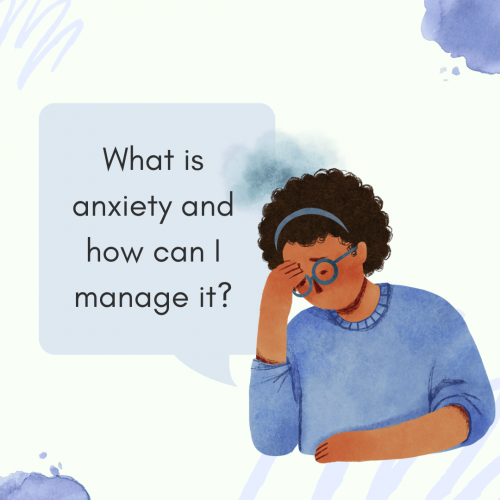Anxiety – Mental Health Awareness Week


Anxiety is the theme of Mental Health Awareness Week 2023 (15th-21st May). We’re proud to support the raising of awareness, and hope to signpost some genuinely useful resources.
In this post, we will touch on:
- What is anxiety?
- How can it present?
- What impact can it have?
- How can you manage it?
- What are some helpful resources?
What is Anxiety?
Anxiety is a normal emotion which everyone will experience at some point in their life, especially given a global pandemic and the cost-of-living crisis. You may feel anxiety during times of stress, like sitting an exam, dealing with finances, doing an interview, experiencing relationship issues, but it’s when it becomes a regular occurrence and can spiral out of control that it can develop into a mental health issue.
Officially, the NHS define anxiety as ‘’a feeling of stress, panic or fear that can affect your everyday life physically and psychologically’’.
It’s important to recognise the distinction between a normal level of anxiety and an anxiety disorder. A mental health disorder is usually characterised as something which affects your everyday life.
How can it present?
Physical symptoms-
- Panic attacks, fidgeting, digestive issues, aches & pains, dizziness, tiredness, headaches, insomnia, hot flushes, pins and needles etc.
Psychological symptoms-
- Uncontrollable worrying, sense of dread, depersonalisation, derealisation, irritability, loss of concentration, ruminating, low mood, reassurance seeking, restlessness etc.
What can the impact be?
Having an anxiety disorder can be a debilitating experience for a sufferer, it can affect the following amongst other things:
- Self esteem
- Career & ability to function at work
- Ability to enjoy/do hobbies
- Avoidance behaviours- avoiding attending the doctors, socialising, leaving the house, answering the phone.
- Driving
- Studying
- Aspirations for your life
- Social life- cancelling plans and social occasions
How can you manage it?
Practical tips:
- Share how you are feeling, whether that’s with a loved one, friend, or family member.
- Make an appointment with your GP- you can discuss treatment options such as medication or Cognitive Behavioural Therapy, which can help change the way you think.
- Download the STOPP app- can catch yourself in an anxious cycle before it escalates.
- Schedule worry time- write your worries down and address them later in the day when you’re less emotionally invested.
- Try the 333 technique- list or mentally note 3 things you can see, hear, and smell. This can bring you back to the present moment.
- Try 10 and try a mindful body-scan to relax- Part 3: Practicing Mindfulness with the Body Scan | HPFT IAPT Services (hpft-iapt.nhs.uk).
- Try to acknowledge your thoughts, notice any judgement, and let it pass. It can be helpful to view your thoughts as ‘’leaves on a stream’’. You do not need to respond to or engage with every thought which enters your mind.
- Try box breathing. Breathe in for 4, hold for 4, breathe out for 4, pause for 4.
- Diaphragm breathing can also help as it allows the parasympathetic or ‘rest and digest’ nervous system to kick in.
- Create a mantra to soothe yourself in moments of anxiety like ‘’this too shall pass’’. If you can sit in the anxiety, the feeling will eventually dissipate.
- Avoid avoidance if you can, as it can keep the anxious cycle going.
- Keep a journal throughout the day of any thoughts and respond later in the day with ‘’what is a more neutral way of viewing this’’.
- Try meditation. It can be challenging at first but start with 5 minutes a day and build up. Headspace offer some free meditations on YouTube.
Lifestyle tips:
- Get moving- exercise lowers cortisol (the stress hormone) and boost endorphins (the feel-good hormones). Consider low-impact options like swimming or yoga.
- Get outside, even if only for 5/10 minutes a day. You can build it up if you find it helpful.
- Adjust your diet, incorporate some more fruits and veggies. Studies have linked poor mental health with inflammation. Do a little research on some anti-inflammatory foods (E.g., fish, berries, broccoli).
- Get your bloods checked, nutrient deficiencies like low Vitamin D, or B12 can cause or worsen mental health difficulties.
Resources:
- NHS-Every Mind Matters: Every Mind Matters – NHS (www.nhs.uk).
- Anxiety UK- mental health charity offering subsidised therapy and annual subscription service- National charity helping people with Anxiety – Anxiety UK
- Wellspring- affordable mental health service – Mental Health Support – Wellspring Therapy & Training.
- Mind Charity- Using this tool – Mind.
- Mental Health Foundation tips and tools- Explore mental health.
- Financial worries leading to mental health issues? Contact Citizens Advice Bureau – Citizens Advice.
- STOPP worksheet- pdf (getselfhelp.co.uk)
- Therapy in a Nutshell – free channel on YouTube which talks you through principles of CBT: (382) Therapy in a Nutshell – YouTube.
Crisis Support Lines:
- To talk about anything that is upsetting you, you can contact Samaritans 24 hours a day, 365 days a year. You can call 116 123 (free from any phone), email jo@samaritans.org or visit some branches in person. You can also call the Samaritans Welsh Language Line on 0808 164 0123 (7pm–11pm every day).
- If you’re experiencing a mental health problem or supporting someone else, you can call SANEline on 0300 304 7000 (4.30pm–10.30pm every day).
- National Suicide Prevention Helpline UK. Offers a supportive listening service to anyone with thoughts of suicide. You can call the National Suicide Prevention Helpline UKon 0800 689 5652 (6pm to midnight every day).
- Campaign Against Living Miserably (CALM). You can call the CALM on 0800 58 58 58 (5pm–midnight every day) if you are struggling and need to talk. Or if you prefer not to speak on the phone, you could try the CALM webchat service.
- If you would prefer not to talk but want some mental health support, you could text SHOUT to 85258. Shout offers a confidential 24/7 text service providing support if you are in crisis and need immediate help.

Post by Laura Sandiford
Impact Manager
A keen storyteller & collaborator, Laura works as the Impact Manager together with our Head of Impact, Hannah, where she measures and highlights the impact of Better Connect across the business, programmes and partnerships.
She does so by working with a range of partners, participants and externals to gather information and stories, which she then translates into a range of engaging content across Better Connect’s channels. Ensuring the ‘Better Connect’ story is woven throughout all communications is a large part of Laura’s role, as is demonstrating the ripple effect across our programmes, partnerships, and sector-advocacy.
Laura’s favourite part of the role is connecting with the faces behind the case studies and giving voice to their experiences.
Learn more about Laura